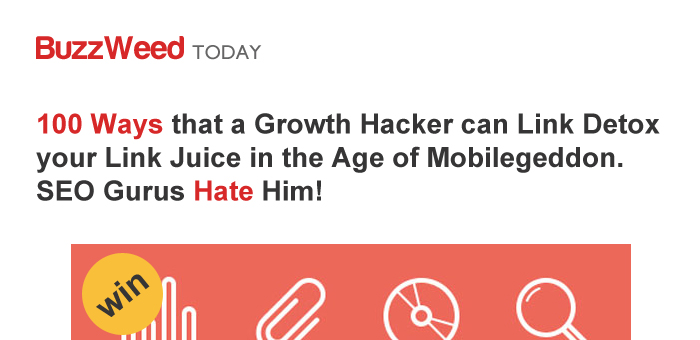Digital Marketing Buzzwords and Why You Should Stop Using Them
The trend of over-the-top buzzword usage in digital marketing needs to stop. Turning simple processes and concepts into catchy phrases can probably provide value when it comes to sales pitch scenarios, but in my experience, it only brings more confusion than clarity.
I don’t even understand the reason why people create and use them in the first place. Would it hurt to use concise language in today’s age of advanced web analytics? Do marketers really need to justify their value by using made-up words to confuse potential clients? Digital marketing should be clear, transparent, measurable and accountable. Substance over style. Numbers over words. This is supposedly what separates online marketing from traditional marketing.
Being in the digital industry for so long, I’ve had the privilege of working alongside exceptional and talented web developers, search engine marketers, graphic designers, web analysts and link builders. Having said that, I’ve also worked with people who, more often than not, rely on lip-service saying they know and understand digital concepts, when in reality, they have no idea about the skillful execution of these concepts and how it does or does not apply to a particular business. These are the same people who use buzzwords in an attempt to give an appearance of value where there actually is non. SEO people are the worst offenders.
Here are some of the popular buzzwords that you will find or hear in marketing conferences, brainstorming activities, Facebook group threads, online marketing forums, proposals, pitch scenarios, and monthly meetings:
Link Juice
This is not some magical potion that will make your website profitable. Way back in 2010, I remember seeing a sales manager presenting the value of link building to a client by pouring a glass of water into another glass. It’s just a weird way of saying that a website’s perceived value (even the spammy ones) will be poured onto your own website if they build a link to it. The result: Your site ranks higher in search engines for certain search terms.
What marketers should say: You need inbound links from quality websites towards your site.
Link Detox
It’s like saying that your website is poisoned and they have the antidote. When Google updated its algorithm in 2013, websites dropped like flies from the search engine results pages because of old tactics (see “link juice”). Amidst the plague, “link detox” was concocted. The funny and ironic thing about those who pitch this buzz term to clients, is that they were the same people who built spam links to your site in the first place. It’s like an antidote salesman selling products to victims he personally poisoned.
What marketers should say: Spam sites are linking to your site and this is bad if you want to rank organically in Google.
Rockstar, Ninja & Guru
SEM guru, web dev rockstar, web design ninjas – I hear this all the time when it comes to awarding or commending digital marketers or read about this in a marketer’s resume. I wonder if these guys also displayed exceptional knowledge of life lessons in the Hindu doctrine along with their SEM skills? Or if they helped lead a party member on top of Mount Mordor? My point is, anybody can claim that he is a ninja, wizard, knight, healer, etc. People need to distinguish real qualifications from 90’s video games job titles.
What marketers should say: I can do a great job of making your search engine marketing campaign profitable and work efficiently with minimal supervision. Listed below are my certifications and relevant experience.
Growth hacker
When I was younger, my knowledge on hacking was loosely based on movies which meant that you could sneak past into encryption protocols in order for you to get private information. Nowadays, it seems that “hacking” something means being able to change a Facebook cover photo or sneaking a comment link on blog posts. Marketers labeling themselves as a “growth hacker” seems to be more of a ploy of overcompensating for something than a way of standing out.
What marketers should say: I am a digital marketing professional. I helped Tiny Company A increase their conversions by XX%
Mobilegeddon
News broke out that Google will be updating its algorithm to penalize websites that are not mobile-friendly. This is a perfect example of online marketing people blowing something out of proportion. I’ve seen multiple panic-inducing posts about the mobile algorithm update spreading like wildfire. What’s worse is people are quick to join in on the hype even without studying mobile attribution and mobile conversion data for their clients. They just pitch misguided, panic-based assessments so that they can push their mobile website re-design packages.
The real “mobilegeddon”: I’ve been doing mobile searches on Google in the past few days and I’m consistently seeing ads at the top 3 positions. Mobile CTRs on my campaigns have had boosts in the past weeks. If it pushes through, this spells the end of mobile organic rankings.
Honorable mentions: Skyscraper Technique, Website Strength Audit, Content Gap Integration, Thought Leader, Deep Linking, Content is King, White Hat.
What are your favorite cringe-worthy buzzwords that people religiously use for digital marketing? Get in touch and I might include them in this list.
Comments are closed.

